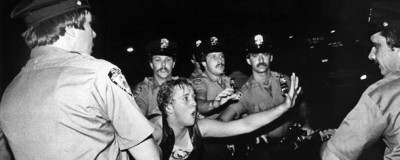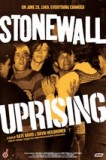| Reviews & Columns |
|
Reviews DVD TV on DVD Blu-ray 4K UHD International DVDs In Theaters Reviews by Studio Video Games Features Collector Series DVDs Easter Egg Database Interviews DVD Talk Radio Feature Articles Columns Anime Talk DVD Savant Horror DVDs The M.O.D. Squad Art House HD Talk Silent DVD
|
DVD Talk Forum |
|
|
| Resources |
|
DVD Price Search Customer Service #'s RCE Info Links |
|
Columns
|
|
|
Stonewall Uprising

Kate Davis and David Heilbroner's new documentary Stonewall Uprising does several thing skillfully, but its greatest value may be the deftness with which it contextualizes the social and cultural temperature of the time. The "culture wars" that are brewed up against homosexual Americans to score cheap political points may hinge these days on secondary concerns like marriage and serving in the military, but lest we forget, it was within our very recent past that the mere act of homosexuality was a crime--that men and women could be hauled off to jail for going to a bar, for being caught in a "raid," and even for what they did behind closed doors.
What Davis and Heilbroner's film puts across, with stark clarity, was the forces that were brewing in the air when the patrons of the Stonewall Inn said, in the face of police intimidation and harassment, "enough." And this is where the full force of the documentary film format comes into play--we can read about mass media homophobia, and think we understand it from a few sniggering jokes or stereotyped characters in recent films, but can we even fathom what it was like when there were only three television networks, and one of them played a "news report" as vile and damaging as "CBS Reports: The Homosexuals"? (Sample narration, by no less than Mike Wallace: "The average homosexual--if there be one--is promiscuous.") Can we imagine being a teenager with homosexual tendencies, and watching a shocking "educational" film like "Boys Beware" or "Perversion for Profit," or being in a school assembly, terrorized and threatened by a police detective (in Dade, Florida, of course), as we see here? Can we imagine being one of the men in those old films (also seen in the opening of Milk), hiding their faces in shame from the cameras capturing the bar busts?
"Before Stonewall," says writer Eric Marcus, "there was no 'coming out' or 'being out'." The most one could do was move away from home, to the urban centers where like-minded individuals migrated, and the filmmakers present a vivid portrait of New York City (and particularly Greenwich Village) in the 1960s--the draw of it, and the dangers. Yes, one could find peers and contemporaries, but homophobes also knew where to go for some fashionable gay-bashing, and police knew which bars to target. Stonewall Uprising explains how the Mafia got in on the New York gay bar scene, fronting the costs and risks for an easy buck and paying off the cops to warn them before raids, and to hit them only on off-nights ("I never bought a drink at the Stonewall," recalls one patron. "Mafia house beer? Does anyone know what that is?").
But within the clientele, resentments were percolating; anger and frustration was escalating. The political sea changes of the late 1960s, the civil rights battles, the openness of the era, and the disgusts with the antagonizing of the police--all of that came to a head in the early morning hours of June 28, 1969, when a police raid turned into a protest, when the cops found themselves outnumbered and (metaphorically, if not literally) outgunned. That raid, and the uprising that followed, is reconstructed in Stonewall Uprising, moment by moment, with the help of eyewitness testimony (both from the men in the bar and the main cop on the scene) and a pulsing score by Gary Lionelli.
The filmmakers press on from the Stonewell, eloquently describing how the fuse was lit that night, and where it went from there--the thrill of standing up to fight, and to be counted. The film palpably conveys the sense of brotherhood and sisterhood and that grew out of that moment, and how it changed the direction of the movement; it culminates a year later, on June 28, 1970, with the first gay pride march. The descriptions of that day are moving and memorable. "That's when we knew," one marcher remembers, describing the feeling of the crowd amassing behind them, "that we were ourselves for the first time."
There are occasional flaws--there's scant footage of the raids and riots, for example, so reenactments are mixed in (not altogether successfully). And a few interesting sidebars are left unexplored; we see and hear from Ed Koch, Congressional representative for the area at the time, but the film doesn't delve into the continuing questions (most recently asked in Kirby Dick's Outrage) about Koch's own sexuality. Those detours are presumably left out due to time--the film runs a tight, fully packed 80 minutes, and conveys volumes of information briskly and efficiently within its superbly constructed framework. Stonewall Uprising is an important film and a valuable document, but also an entertaining and vibrant look at a powerful moment in our recent history.
Jason lives in New York. He holds an MA in Cultural Reporting and Criticism from NYU.
|
| Popular Reviews |
| Sponsored Links |
|
|
| Sponsored Links |
|
|
| Release List | Reviews | Shop | Newsletter | Forum | DVD Giveaways | Blu-Ray | Advertise |
|
Copyright 2024 DVDTalk.com All Rights Reserved. Legal Info, Privacy Policy, Terms of Use,
Manage Preferences,
Your Privacy Choices | |||||||











